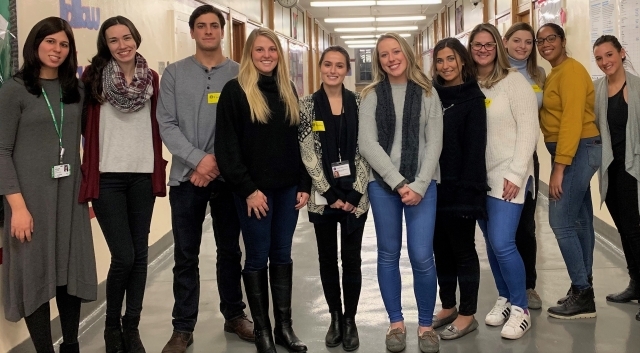
As part of a continuing Academic Service-Learning (AS-L) project led by Assistant Professor Shruti Deshpande, Ph.D., of the Department of Communication Sciences and Disorders, 19 third-year Doctor of Audiology (Au.D.) students provided free hearing and speech perception testing, along with hearing conservation education, to high school students from the Liberty Partnerships Program (LPP) and Upward Bound. The project was funded through two AS-L grants from St. John’s University.
Through the project, Au.D. students in Dr. Deshpande’s Central Auditory Processing Disorders Course gained hands-on experience in detecting so-called “hidden” hearing loss, or hearing loss that occurs at frequencies that aren’t typically tested for in standard screenings and that affect auditory processing and understanding of speech. Adolescents are also a population that don’t receive regular hearing screenings, unlike the pediatric and geriatric population. An increase in use of smartphones among teens, including streaming music through headphones at loud volumes and for long periods of time, also puts this population at higher risk for hearing loss.
The students who benefited from the AS-L project represented marginalized areas of our community, and were even less likely to receive hearing screenings or education about safe smart phone use. “We have universal screening for babies in New York City, but school-age children can fall through the cracks,” said Dr. Deshpande. “Hearing conservation education simply isn’t present in schools.”
Colleen O’Brien ‘16C, who assisted Dr. Deshpande in providing hearing screenings to students at John Adams High School in Ozone Park, NY, found an engaged audience among students who participated. “Once we started doing the hearing screenings, all of the kids got more interested in hearing conservation and started asking questions,” she said. “Having that screening aspect to the educational program really brought everything we were talking about into reality. It was no longer hypothetical to them.”
Ms. O’Brien also learned about the unique needs of the adolescent population during this AS-L project and a service trip to Peru she participated in through the Long Island Audiology Consortium and the Starkey Hearing Foundation. She recalls one patient from that trip, a 14-year-old girl who was born deaf and bullied in school. The girl refused a hearing aid because she felt it would draw more attention to her inability to hear. “It really takes a special type of person to work with teens and know what to say to them that will resonate,” Ms. O’Brien said. “Adolescents are at an age when they are starting to use devices more often and developing independence with healthcare in general. Through working with Dr. Deshpande, I understand how critical it is to reach this vulnerable population and make audiology more accessible to younger people.”
In addition to Ms. O’Brien’s efforts, Dr. Deshpande’s research assistants – Au.D. student Martina Wasef and senior Speech-Language Pathology and Audiology major Samantha Nadolski – helped her execute the AS-L project.
Dr. Deshpande will expand her efforts at increasing hearing conservation among adolescents to the Staten Island community in March 2019 through a grant from the 30,000 Degrees Initiative, a partnership between higher education institutions and high schools that seeks to increase the number of college graduates in the borough. Not only will this allow adolescents in Staten Island to be screened for hearing loss and receive education about hearing conservation, it will also introduce them to Audiology as a possible career path. “Audiology is a highly ranked profession, but there is a dearth of trained professionals,” said Dr. Deshpande. “There is a demand for more diversity among audiologists so that we can serve patients who come from a wide range of backgrounds, each with their own individual needs.”
